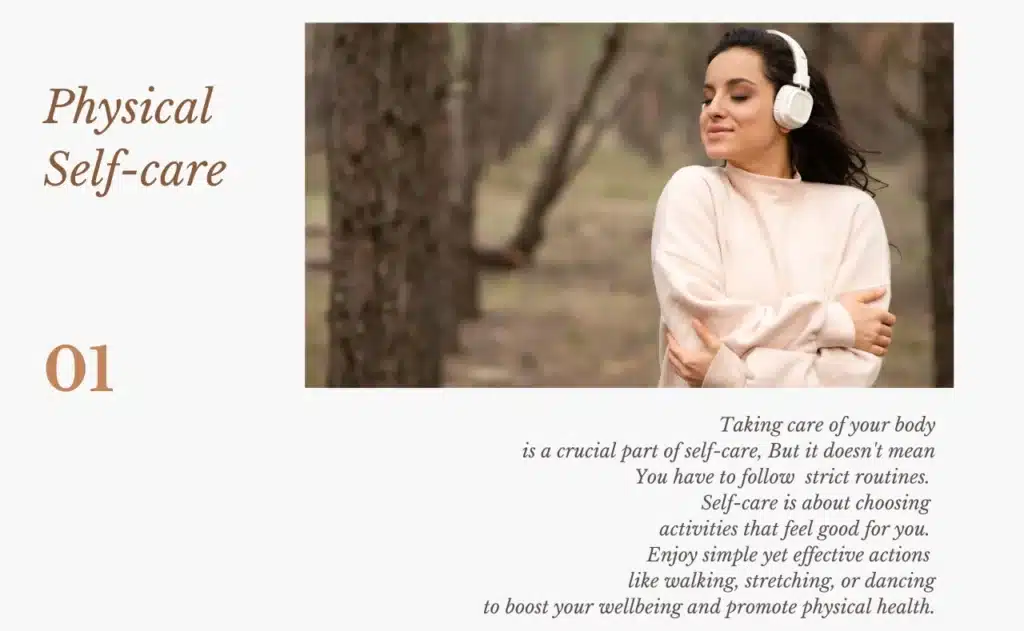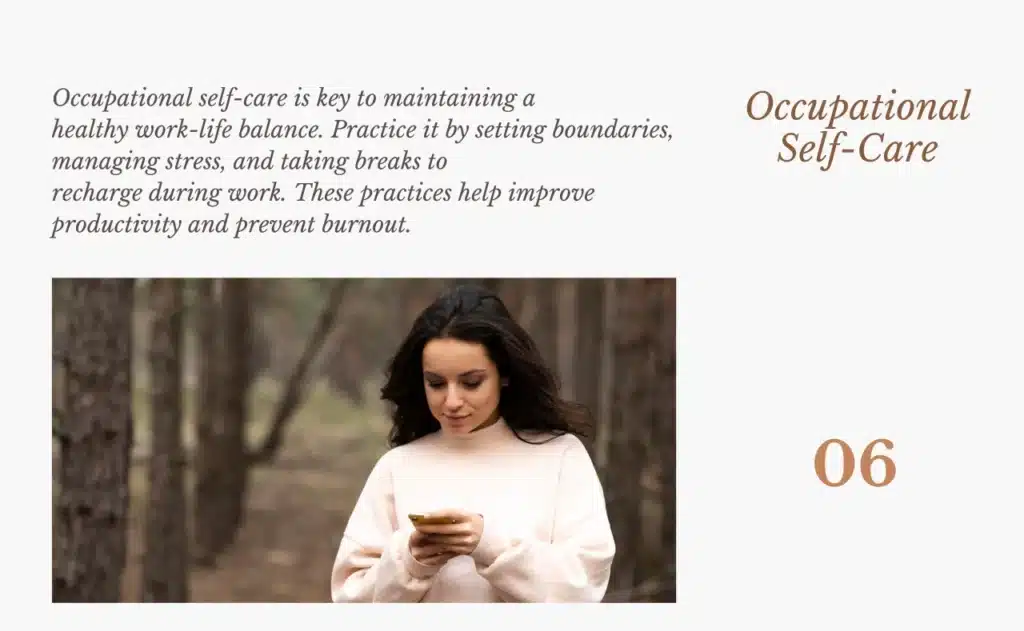Although being a mother is an amazing journey, it also presents certain mental and physical difficulties. There are times when you neglect your own care in the midst of taking care of your family and all the day-to-day activities in your life. However, remember that self-care is vital not only for you, but also in your role as a caregiver to others.
Self-care is not a nice-to-have but is a must-have. Considering your physical, emotional, and mental wellbeing, you will be more energized, patient, and happier at home. Self-care will allow you not only to prevent burnout but also to feel better and happier overall.
In this guide, we will discuss 8 types of self care as well as simple, readable methods you can implement in your life for each form. By simply embracing these habits in your daily life, you will build a more enjoyable experience as a mom and feel more centred
What Is Self-Care?
So what exactly is self-care? Self-care can be defined as any act that we undertake with the aim of caring for our mental, emotional, and physical wellbeing. It is about taking time and energy to replenish yourself and balance yourself. Self-care is usually the last thing on the list of mothers, but it is important to recognise that self-care should not be considered as self-centeredness; it is a mandatory process that aids in keeping health in general.
There are many aspects of self-care, and all these elements can be considered in your efforts to cope with stress, develop resilience, and overall be happier with yourself. With the help of these 8 types of self care you can achieve everything in your life and become more effective in addressing the troubles.
Why the 8 Types of Self Care Matter for Moms
Mothers usually put their families at the centre, and this may result in burnout, resentment, and loss of well-being. But self-care is no longer selfish; it is critical to maintaining energy, being a good role model to kids, and enhancing better family relationships. According to research by the American Psychological Association, self-care practices, such as mindfulness, can help control cortisol levels and foster emotional resilience. However, the specific reductions, like a 20% decrease, are not directly tied to general self-care in their studies. There is more evidence to support the claim that self-care can alleviate stress, avoid exhaustion, and enhance the mental well-being of parents.
Self-care is a high priority that will allow moms to re-energize in a holistic manner, which breaks the cycle of mom guilt and leads to better life satisfaction. With these 8 types of self care, moms can be balanced and healthy and present the best version of themselves to their families and to themselves.
The 8 Types of Self Care for Moms
1. Physical Self-Care: Nourishing Your Body

The 8 types of self care are based on physical self-care, which directly supports your body’s needs for movement, rest, and nutrition. To moms, the physical strain of being pregnant, running after toddlers, or making endless errands would cause exhaustion when overlooked. However, prioritising physical self-care gives you resilience, boosts your immunity, and helps you sustain energy with your family without collapsing.
How to Practice Physical Self-Care:
- Average 7-8 hours of sleep and develop a calming bedtime habit.
- Consume only balanced diets consisting of fruits, vegetables, lean proteins, and whole grains.
- Take time to do little and simple activities like a 20-minute walk or several cosy yoga postures.
- Hydrate yourself by drinking at least eight glasses of water a day.
- Work out under natural sunlight, and you’ll feel better and get more vitamin D.
- To overcome stress and prevent pain, observe your posture in the daytime.
2. Emotional Self-Care: Managing Your Feelings

Emotional self-care is yet another vital component of the 8 types of self care and that is what enables you to control and feel your emotions without getting stressed out. Being a mom, you have a variety of moods in your day, as you may be happy to see your children grow or irritated that everything is going on with your life. Emotional self-care is required in this case.
How to Practice Emotional Self-Care:
- Develop a mindfulness practice by doing breathing exercises or progressive muscle relaxation to develop some sense of grounding.
- Note down what you have thought and felt so that you can process your feelings.
- Master the art of saying no when necessary and also create boundaries.
- Engage in creative self-expression, such as drawing, dancing, or singing
- In case of anything overwhelming, a call to a friend, partner, or seeking some therapy should be a good option.
- Be sympathetic when a situation is difficult: Take a break, breathe, and say to yourself, I am doing the best that I can, and that is all that is needed.
3. Mental Self-Care: Nourishing Your Mind

Mental self-care is a necessity in the 8 types of self care that are devoted to maintaining your mind sharp, stimulated, and rested despite your day-in, day-out demands. In the case of moms, it is hard to focus since the stressful environment and multitasking are always on their mind, and it is hard to concentrate. Developing this aspect makes you more explicit, creative, and prepared to deal with the problem of raising children without any problems and having fun.
How to Practice Mental Self-Care:
- Set aside 15-20 minutes a day to relax and read.
- Play brain games, solve puzzles, or do crosswords to keep your brain smart.
- Take up a new activity or a new hobby that would keep your mind busy.
- Have a daytime break to refresh and revitalise.
- To shift your frame of reference, set aside some time each day to consider the things you are grateful for.
- Make time restrictions on screen time to avoid mental fatigue, particularly at night
4. Social Self-Care: Building and Maintaining Connections

One of the important components of the 8 types of self care is social self-care, which implies the necessity to cultivate and develop relationships with relatives, friends, and society in general. Through effective social networks, women will feel less lonely and have better emotional well-being. The presence of a good support system brings companionship, emotional support, and can help individuals overcome life’s difficulties and feel a sense of belonging.
How to Practice Social Self-Care:
- Find time to meet your friends, although this may be in short sessions.
- Locate a support group (online or real-life) of other moms.
- Spend quality time with family, either playing games or going out.
- When you are in need, never hesitate to request help from others.
- Connect with your community by volunteering to make a difference in your community.
- Participate in social events to build a support group.
5. Spiritual Self-Care: Nurturing Your Soul

Spiritual self-care is one of the foundational components of these 8 types of self care that assist you in reaching your inner self, a sense of purpose, or something bigger without involving a particular religion. To moms, the constant timetable of schedules may keep you isolated or desolate, yet the practice brings peace, finds happiness once more, and makes you realize that you are more than mom duties. It builds strength and enables you to tackle the issues with a greater purpose and be a role model of mindfulness to your family.
How to Practice Spiritual Self-Care
- Give yourself a few minutes every day to meditate or pray, and just focus your mind by taking a few breaths to silence the mind.
- Take a short walk or silent rest in nature, and renew your spirit in the fresh air of busy days.
- Begin with an appreciation routine (three things you are thankful for every night) to enhance connection by having two or three moments with the family.
- Read motivating spiritual or philosophical books that encourage relaxation and introspection, such as a brief chapter of The Power of Now.
- Give yourself the challenge of doing little good things like saying a nice word to a stranger or assisting a neighbor, in order to cultivate your soul and be more connected.
- Look back at the purpose of your life each week to determine what really matters to you and use this to make decisions and bring purpose into your parenting.
6. Occupational Self-Care: Finding Balance in Your Work

One of the most important aspects of the 8 types of self care is occupational self-care, which consists of taking care of your professional life without letting it negatively impact your personal time. For moms, deadlines and diaper changes can become so intertwined that they may lead to resentment or exhaustion. Emphasising this type, you preserve your energy, maintain career development, and demonstrate to your kids work-life balance and be sure that your employment is benefiting your family, not exhausting it.
How to Practice Occupational Self-Care:
- Set work and family life separation- close down at a specific time and do not check emails at family dinner.
- In the office or the home office, assign some tasks to someone to ease the burden, such as dividing the household chores with a partner or a virtual assistant to complete the administration.
- Have brief and frequent rests in between your working hours, like a 5-minute pause, to refresh your batteries and keep your head straight.
- Write down short- and long-term career objectives in a written list so that you can be motivated and stay focused on what you love.
- Take up new skills with brief online courses or workshops (such as a 20-minute course based on Coursera) to keep your job stimulating and interesting.
- Manage time with the help of time management tools, e.g., Todoist, the application that allows prioritising tasks and eliminating overload-related stress.
7. Environmental Self-Care: Creating a Peaceful Space

The surrounding is a factor that contributes to your well-being. Environmental self-care involves establishing an environment that enhances relaxation and productivity. Home messiness or disorder may be a contributor to the stress factor, whereas a clean and well-organised space will enable you to feel more comfortable. This is one of the most important practices of the 8 types of self care.
How to Practice Environmental Self-Care:
- Spend a few minutes each week decluttering and tidying the area to reduce stress.
- Find a quiet spot in your house and designate it as your designated resting spot.
- Fill the environment with flowers as a way of unwinding.
- Have soothing perfumes (lavender or chamomile) to ensure that the environment is soothing.
- Make your own space personal, and feel free to have things that will make you comfortable.
- Control the noise to create a quieter place to stay at home.
8. Financial Self-Care: Managing Your Finances

An aspect of the 8 types of self care that is frequently ignored is financial self-care, but this is essential in reducing financial anxieties that drain mental energy. Childcare or school fees can be expensive, but active habits create peace of mind, lower anxiety levels, and leave more space in the mind to enjoy family moments rather than worry about the budget all the time.
How to Practice Financial Self-Care:
- With the help of a simple application, such as Mint, monitor your monthly income and spending to put together a realistic and achievable budget.
- Create an emergency fund by saving only 20 a week- save 3-6 months of necessities to handle the unexpected like medical expenses.
- Establish certain financial targets, e., a family vacation or paying off your credit card, and divide them into small, measurable steps.
- Be sure to check credit cards and loans regularly, with high-interest debt paying the first before the snowball effect.
- Ask a financial professional or use free materials such as podcasts (e.g., “Her Money”, etc.) when you are overwhelmed; many have tips on how to spend your money as a mom.
- Look at your financial plan after every quarter to see that it fits in relation to your changing family needs and goals.
How to Stay Consistent with These 8 Types of Self Care
Self-care can be a challenging routine to follow, especially for busy moms. However, consistency is the primary issue that will transform the 8 types of self care into a natural lifestyle. The following are some of the ideas that can help you stay busy:
- Starting with simple, achievable goals is preferable, like exercising for 15 minutes or keeping a journal for 5 minutes each day.
- Incorporate self-care into your daily activities, like meditation in the morning or going for a walk on the weekend
- Set phone reminders to help you incorporate self-care activities into your daily routine.
- Have a record or a journal to track your progress. You can use an app too.
- Be flexible when life changes your schedule and practice self-care in alternative methods.
- Include your family in one of your self-care activities, like walking or playing games together for one night a week.
Final Thoughts: Embrace the 8 Types of Self Care
Self-care is not an option, but is a demand of a healthy and efficient mom. These 8 types of self care will be applied to ensure that you are not only taking care of yourself, but also your family, your body, mind, and soul. You have to keep in mind that you cannot pour out of an empty cup and, therefore, you have to take care of yourself first. When you invest your time in yourself, you will be provided with the framework of a happy, satisfying, and balanced life as a mother.
By these 8 types of self care, you will have established a healthy routine of self-care, working toward yourself and your family. Self-care will improve your ability to sleep better, lessen your stress level, and live in the present, either physically, emotionally, or socially. Therefore, breathe, adopt these 8 types of self care, and take care of yourself; it is worth it.




